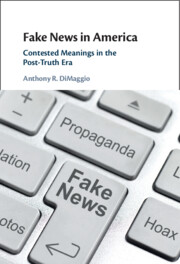Book contents
- Fake News in America
- Fake News in America
- Copyright page
- Dedication
- Contents
- Figures
- Tables
- Contributors
- Acknowledgments
- Introduction
- 1 The Age of Post-Truth Politics
- 2 The Phenomenon of Fake News, Part 1
- 3 The Phenomenon of Fake News, Part 2
- 4 The Phenomenon of Fake News, Part 3
- 5 Fake News as Propaganda
- 6 Fake News and US Foreign Policy in the Trump Era
- 7 The Intensifying Fake News Crisis in the Age of Social Media
- Conclusion
- Bibliography
- Index
4 - The Phenomenon of Fake News, Part 3
Public Opinion and Contested Meanings
Published online by Cambridge University Press: 30 August 2023
- Fake News in America
- Fake News in America
- Copyright page
- Dedication
- Contents
- Figures
- Tables
- Contributors
- Acknowledgments
- Introduction
- 1 The Age of Post-Truth Politics
- 2 The Phenomenon of Fake News, Part 1
- 3 The Phenomenon of Fake News, Part 2
- 4 The Phenomenon of Fake News, Part 3
- 5 Fake News as Propaganda
- 6 Fake News and US Foreign Policy in the Trump Era
- 7 The Intensifying Fake News Crisis in the Age of Social Media
- Conclusion
- Bibliography
- Index
Summary
Chapter 4 analyzes public opinion surveys to understand how Americans define fake news. I show that concern with fake news is pervasive among Americans, despite a majority who struggle to define what it means. I identify various ways that the phenomenon of fake news is contested by Americans, with at least nine different definitions for the concept being embraced by large segments of the public. I examine where concerns with fake news are likely to originate, identifying statistical predictors of public concern with the phenomenon. Such concerns are more likely to be expressed by privileged sociodemographic groups, heavier media consumers, and those with high levels of media distrust – the last factor itself appearing to be a function of right-wing partisan and ideological socialization. I examine Americans’ thoughts about how to best combat fake news. I focus on various definitions of fake news that I argue are the most practically significant out of the nine identified in the chapter – those related to reporters’ overreliance on official (corporate and governmental) sources in producing the news, partisan biases in the news, and the rise of conspiracy content in media sources.
Keywords
- Type
- Chapter
- Information
- Fake News in AmericaContested Meanings in the Post-Truth Era, pp. 81 - 109Publisher: Cambridge University PressPrint publication year: 2023



